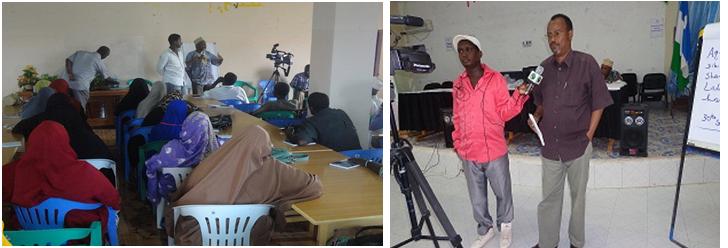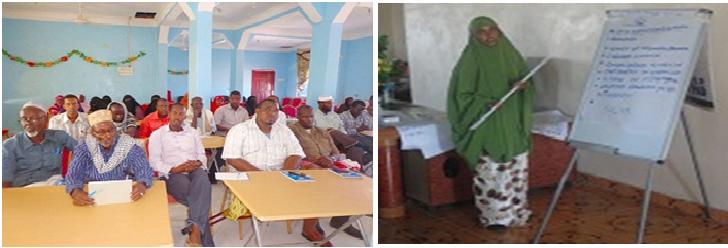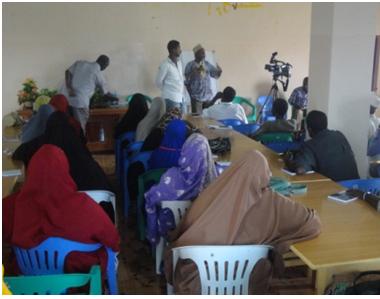{Mr. Gumbe, Diakonia Program officer speaking to the participants} {Director General of Public Work explaining there is a lack of land law and land policy}

Introduction
The Review on legal and regulatory framework on assets/property programme was aimed to document the property ownership system that is in existence in Puntland. KAALO conducted 8workshops in four main towns of Puntland (Bosasso, Garowe, Gardo and Galkayo). The system was discussed at community level bringing together internally displaced persons (IDP), clan elders, community representatives, local nongovernmental organizations, international nongovernmental organizations, local authorities, and media and private sector representatives. In the discussion representatives stated the preferable future of property ownership in Puntland.
Government (in the form of several ministries) was available in these discussions to provide the government position on the issue. In addition to that documentation, disseminations and follow ups of the proceeding workshops were carried out. Though legal and regulatory framework on property/asset rights was discussed in the workshops in general, giving great consideration and responding to requests from local and government authorities workshops put particular focus on land issues chiefly land-grabbing which causes daily conflicts and clashes in either between individuals or sub clans. It was realized that one of the leadings of conflicts and clan disputes in Puntland are land-grabbing and illegal claiming public property.
Each workshop targeted 60 participants, that means the number of beneficiaries was 480 people from different categories of the community.
The table below shows in summary the locations, number of participants, type of beneficiaries and dates that the activities were carried out. .
| Project Name | Location | Duration/day | Participants | Date | Type of beneficiaries |
| Review on Legal and Regulatory framework on Asset/property Rights | Bosasso | 3 | 60 | 20th –22nd Oct 2013 | (IDP), clan elders, community representatives, local nongovernmental organizations, international nongovernmental organizations, local authorities, and media and private sector, government officials. |
| Bosasso | 3 | 60 | 8th -10th Feb.20 14 | ||
| Garowe | 3 | 60 | 30thSept.–2nd Oct. 2013 | ||
| Garowe | 3 | 60 | 20th-22nd Nov 2013 | ||
| Gardo | 3 | 60 | 26th –28th Oct. 2013 | ||
| Gardo | 3 | 60 | 15th-17th Feb. 2014 | ||
| Galkayo | 3 | 60 | 8th Oct. –10th Oct2013 | ||
| Galkayo | 3 | 60 | 22nd-24th Feb. 2014 | ||
| 480 |

{Participants discussing the problem of Landgrabbing and property rights} {Asha presenting her group work on conflicts and clashes cause by land-grabbing}
Methodology
- Participatory,
- Brainstorming,
- Group work
- Presentations,
- Group discussions,
- Open discussion,
- Question and answer,
Materials used:
- Flip charts,
- Markers,
- Notebooks,
- Pens,
- Scotches,
- Flip stand,
- Projector and
- Computer.
Kaalo carried out preliminary meetings with local authorities aimed to get their acceptance and other preparations necessary to the workshop were made. Workshops were opened with verses from Holy Quran; opening remarks were made by officers from local authorities. Self introduction by the participants and registration were also done. The participants liked the workshops and said that they had idea and had platform.
Opening Remarks
Officers from the government and local government’s authority clearly said that there is no land law and land policy in Puntland and 
there is no single miter of land that is in the hands of the government. The government officers who delivered speeches included the Director General of Ministry of Public, Mr. Abdulkadir Sh. Mohamud. In his remarks he said that the Ministry has struggled to develop land law and land policy but it has not achieved that yet. Mohamud Ali (Gumbe) was among other people that have raised questions on problems of land grabbing and illegal claiming public property.
Mr. Mohamud Ali Gumbe, Diakonia programme officer explaining what the landgrabbers reason their land ownership as : “ I saw it, I demarked and owned it, it is my property”. Participants added to that there is no one looking after the public property or even people are supposed to protect them are taking part in the lootings.
Workshops environment
Facilitators used to begin sessions with telling the participants enjoying stories to created positive atmosphere and capture the minds and ears of the participants. So the participants were encouraged to show full participation. This was mainly discussions and debates between the participants on legal and regulatory framework on asset/property rights by highlighting the main points of the subject including identification of the problems, causes and solutions.
Participants in discussions
The participants identified the main problem as land-grabbing which is wide spread in Puntland and identical in all Puntland districts. The rights for those land-grabbers to capturing public land and illegally claiming ownership is very distressed. They finger pointed that the main causes of this problem are lack of land law and land policy and incapability or weak governance in Puntland. The participants highlighted factors supporting to land-grabbing that are wide spread of unemployment, arms in the hand of the people, poor administration, high level of corruption and business creation in landgrabbing .
Negative impact Land-grabbing
Impact of landgrabbing has negative impact to the community that created enmity, insecurity, conflict and clashes between clans or individuals. It also has impact on town plan causing no land for public purpose such as schools, hospitals, streets, play grounds, mosques and land over price. it is involved many different categories of the community such business people, unemployed armed groups, sea pirates, Diaspora, traditional elders, local governments and government figures have also involved land-grabbing directly or indirectly.
Participants’ suggestions
Participants suggested solutions to the problem that are the government is to develop land law and land policy and execution with effective law enforcement institution. Government should commit to defend public property and be accountable to its people. Public awareness campaign on stopping land-grabbing is also very important.
Institutions and figures that can play roles to solving the problems
People and institutions that can play role for solving the problem of public land-grabbing include Local government, Ministry of Public work, Ministry for Security and Ministry for interior and local government, Ministry for justice, members of the parliament, traditional elder, religious scholars, media people, women and youth group, NGOs, CSOs, and CBOs.
Establishment of committees
Participant of each town established a committee that were assigned to deal with all property rights concerned parts giving priority to put pressure on the government to take steps to protecting public property and formulation of policies and legal frameworks on property rights giving main concern to land law and land policy formulation.
The challenges that these committees could possible face are threats from land grabbers, lack of acceptance from the government officers, lack of experience within the committee, lack of working facilities, spread of false interpretation to the duties of the committees. But the committees have also opportunity such as many people support the issue, government is likely to accept the committee, land-grabbers may accept faithfully preaches during the awareness campaign by religious scholars and traditional leaders.

One of the committees setting their work plan and discussing the steps they are going to take. They are agreed that the job is very difficult and the main threat to the security is that the people are armed and strongly defending what they illegally claiming as their property.
Duties and responsibilities of the established committees include to Lobby and influence government officers and members of the parliament to formation of land law and land policy and effective implementation with the commitment of the government to defending the public property; They are to advocate for returning back the public property (land) into the hands of the government, while the government is to keep its responsibilities for bringing justice, equality and empowering law enforcement institutions. The committees are assigned to conduct meetings with all concerned parts such as mayors, Ministers of the public, security, interior Ministry, Ministry of wildlife. The committee will mobilize peaceful public demonstrations against illegal claiming public land and land grabbing. The committee will conduct radio and TV debates on land-grabbing for all concerned parts including decision-makers particularly government officers and civil society members, such as lawyers and other knowledgeable figures. Participants had stressed root problem, causes and solution to the problem.
Problem: seizing and grabbing property rights.
Causes; among the causes of land grabbing that participants stated are:
- Bad ambition; there are many people who are grabbing land to make money from it and making it business.
- Ignorance; majority of the people are illiterate according to modern education or religion
- Bad governance; government is not only weak but further uncommitted to carry out activities for the interest of the people and the participants said that there is a Lack of accountability, lack of rule of law, injustice, and lack of government of land policy and land law.
- Lack of faith; participants agreed that land grabbers are faithless people who are not afraid of God or government and also are immoral people.
- Uncultured behaviour; the behaviour of the land grabbers is absolute lack culture and land pirates.
- 6. Poverty; the level of living standard is very low and unemployment is very high, this makes easier for unemployed youths to be hired by business people to grab vast land for them.
- 7. Sea pirates; they are part of the problem. They got money and they are either buying land for more than its cost which encourages those making it business to continue grabbing more land or by themselves taking part in grabbing land.
Solution to the problems
For the bad ambition, the participants said the solution is: Rule of law, justice, awareness, isolating the land grabbers.
For the ignorance participants said solution is: Awareness, free education, teaching the Islamic religion, telling the people the crimes of land grabbing in terms of Islamic law.
For the weak government participants said solution is: establishment of good government which is able to carry out its duties problem and issue land law and land policy, public awareness and collect arm from the people, and accomplish justice and equality, return land ownership into the hands of the government;
For the lack of faith: Learn and practice Islamic religion which respects property right and prohibits land grabbing or robbery, hold meetings and speeches on proper culture and religion awareness make by religious and traditional leaders, tell the people that the land is a public property
For uncultured behavior: public awareness on good culture, implementation of rule of law, isolation of land grabbers and buyers.
For poverty: Job creation, skill training, small fund, awareness, improving the Puntland economic policy, seek for investment,
Or the sea pirates: rehabilitation, isolation, awareness, etc.
Duties and responsibilities of the committees
- Punt pressure on the government to formulate and execute proper laws and policies to all necessary areas including land and fight land grabbers and those seizing public property; they would
- They would have meetings with all higher officers of concerned government institutions including the Mayors of the towns, the Ministry of Public work, Ministry of Interior Ministry, Ministry of wildlife, ministry of Agriculture and Ministry of fisheries and the committee of the parliament that of safeguarding laws and the president of Puntland if necessary.
- The committee also have conducted meetings with the traditional leaders, directors of media houses, business people, religious leaders, women and youth groups to carry out massive campaign against landgrabbing. ,
- The committee are to conduct radio and TV debates on land grabbing between all concerned parts.
Output
- 480 people obtained knowledge on property rights, have understood that public property is people’s property; and have the same opinion on the negative impact of land-grabbing to the community and property rights.
- 480 from different categories of the community had opportunity to inclusive and participatory discussions on problems of landgrabbing to the community.
- Government officers in the workshops declared the government position of legal property rights stating that it failed its responsibilities on protecting public properties.
- To maximize the beneficiaries Radios, websites and TVs broadcast news and radio feature programmes on property rights and problems of land grabbing in the community.
- 480 people understood that without regulatory and legal framework on property rights including formation of land policy and land law is very difficult to protect property rights of the people.
- 4 regional and district authorities engaged and pledged their cooperation
Outcome
- 4 committees, one by each town workshop participants established a committee which has defined duties and responsibilities including lobbying for the formation and execution of land law and land policy.
- Participants understood that land grabbing illegal and robbery of public property;
- Participants realized that the only solution to the problem of land grabbing is the development and implementation land law and land policy justice and equity protected;
- The committees carry out public awareness campaign against land grabbing aimed at isolating the land grabbers like the sea pirate, influencing the people not to buy land from land grabbers and also declare that land grabbing is prohibited by Islamic sharea.
Challenges
- Land is not in the hands of the Government.
- There is no legal and regulatory framework on property Asset/rights;
- Lack of land Law and Land policy in place.
- Property rights particularly land ownership is only title deeds offered by Local governments and there are no other documents in the local governments and Ministry of Public Work, ministry of agriculture, fisheries, etc.
- Government officers are among those illegally claim land or other public properties.
- There is a high level competition of land grabbing
- Arms are in the hands of the people and most of land-grabbers are armed or use armed groups;
- Tribalism; anyone who commit crime or violations will have received support from sub clan without giving any respect to anyone else.
- Weak administration; the administration at all levels is very weak or not functional at all.
- Weak security institutions; those who are assigned to ensure security are untrained or are not satisfied with the job due to very law salary
Possible Opportunities
- Majority of the people support the issue;
- Government is possible to support the committee;
- Land policy may be developed;
- Land grabbers may accept faithfully the preaches of the religious people;
Duties and responsibilities of the established committee
- In order to influence the government develop land law and land police the committee would have meetings with all higher officers of concerned government institutions including the Mayor of the town, the Minister of Public work, Minister of Interior Ministry, the speaker of the parliament and the president of Puntland if necessary.
- In order to carry out awareness campaigns against land grabbing the committee will also have meetings with the traditional leaders, directors of media houses, business people, religious leaders, women and youth groups,
- The committee will mobilize peaceful public demonstrations against illegal land grabbing.
- The committee will conduct radio and TV debates on land grabbing
Recommendations
- Government should come up with a plan that enables it to return public property including land to its hands
- Government should establish a land committee that conduct assessment aimed to learn more about land grabbed and those who grabbed;
- Government should formulate land act and land policy
- Land should be bordered and divided into its use such as land for farming, residence, grassing, and fishing.
- Government should carry out public awareness and call those who captured public land return the land to the government peacefully;
- Government should activate and empower all concerned ministries and law enforcement institutions to implement the land law and land policy;
- Land law and land policy should be set by together the government and civil society organizations including traditional leaders;
- Government should hold general meetings convening representatives from all sectors/stakeholders to reach final agreement on stopping land grabbing.
- People need to be empowered to be able to put pressure on the government to formulate and execute land law and land policy.
- Engage most influential traditional leaders, religious scholars to support the formation of land law and law police.
- Capacitate the law enforcement institutions attributable to the improvement of land issues.
- Carry out public awareness to disseminate the messages against land-grabbing or illegally claiming public properties


